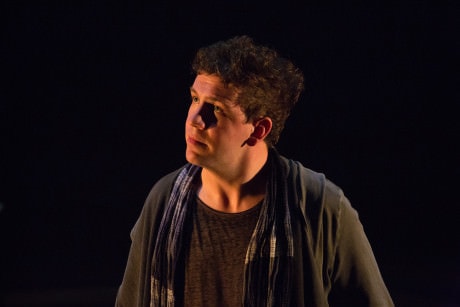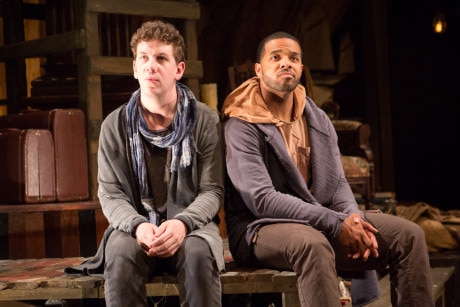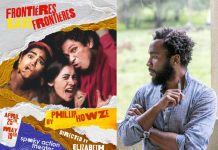In Part 1 of two interviews with the actors who play Rosencrantz and Guildenstern in Folger Theatre’s production of Tom Stoppard’s Rosencrantz and Guildenstern are Dead, meet Adam Wesley Brown.

Please introduce yourself to our readers. What are your favorite roles, and where did you get your training?
My name is Adam Wesley Brown. I am 25 years old, from Louisville, Kentucky. I attended classes at Walden Theatre from the age of 9, performing in all forms onstage and off until I went to college. I moved to Chicago and went to The Theatre School at DePaul University, class of 2012.
I am based in Chicago, and have been seen in Long Way Go Down with Jackalope Theatre, for which I was nominated for a Best Actor Non-Equity Joseph Jefferson Award. In June of 2013, I moved to New York and appeared in the Broadway company of Once the Musical until July of 2014, after which I recorded and released my debut album, Adam Wesley Brown – Live at Bowery Poetry, available on Spotify and iTunes.
I’ll be going back to Chicago after the run of R&G Are Dead to record, and then appear in Aaron Posner’s next project, in collaboration with Teller (of Penn & Teller) and Tom Waits, The Tempest at Chicago Shakespeare Theatre, where I was also in Julius Caesar, and Henry VIII.
What is the show about from the point of view of your character?
Guildenstern and his partner in crime, Rosencrantz, are awoken to a completely strange and unendingly difficult new world where everything seems bent on confusing, confounding and misdirecting them to a gloomy end – despite Guildenstern’s best efforts to understand and keep track of the ever-changing surroundings.
How do you relate to your character? Do you have any similar traits?
Tom Stoppard wrote the play in the late 60s, when he was around 26 or 27. He was a young man, and was grappling with young man dilemmas about his place in the world. Where was his place? What was he meant to do? What was the point of it all if it all leads to the same end as everyone else’s?
Aaron Posner’s original concept was to bring our production back to those beginning concepts. What is it like to be young? What is it like to be young in 2015? How does a fresh-out-of-school, adult behave? Where do they go? In working with Romell and myself, the three of us explored taking Stoppard’s witty and brilliant dialogue and grounding it in truth with our own lives. When have we felt at sea? When have we felt betrayed? In that sense, we both relate to our characters because they are, despite the far superior vocabulary thanks to Stoppard, more or less us. Our response from younger audiences so far has been phenomenal – we are hitting a nerve that people of our generation really relate to.
How did you prepare for your role and what were its biggest challenges? How did you resolve them?
The sheer volume of text Guildenstern has is its own challenge, but Romell and I spent many a night after rehearsals, flipping coins and learning the script together. In that sense we were able from the get-go to learn the show together, and build upon each other’s processes, and keep tabs on the other as they progressed and understood more and more of the text. Having Aaron backing us entirely, along with one of the finest ensembles I’ve ever seen, Romell and I were able to feel confident and plow ahead, knowing we had the entire cast and crew behind us from day one.
You have performed in Julius Caesar and Henry VIII. What are the differences between playing Shakespeare and a more modern play like Rosencrantz and Guildenstern Are Dead?
Stoppard did a really fantastic job in giving us a 10-minute version of Hamlet, wrapped in a very modern play. Walden Theatre’s whole curriculum was based on Shakespeare, so I’ve been speaking that language since I first walked on stage. I have a deep love of the poetry and the beauty of that text. At the same time, we were also afforded the opportunity to work on modern scripts as well growing up – so I feel very much like I’m back at school, juggling Shakespeare scansion and modern scene study on a daily basis. It’s my ideal kind of show, really.
What is your favorite scene in the play that you are in? What is your favorite scene in the play that you are not in?
I can’t speak enough to working with Romell. He is the most game actor I’ve ever met, ready to hop in and try literally anything at a moment’s notice. Both characters have such a vast quantity of text and stage time that you have to have a partnership that is based on trust. We met on the first day of rehearsal and hit it off instantly, which has made the entire process such an utter joy. My favorite part of this show is working with him, and any time we are onstage together we click.
Because we are onstage literally the entire play, it’s also a great joy to watch the rest of our wonderfully gifted ensemble tackle their parts, and come onstage to play with us every night. Watching their progression has been almost as fun as creating this particular Guildenstern.

What do you admire most about your castmates’ performances?
Aaron has filled the stage with some of DC, Philly, Chicago, and New York’s finest. This show, while centered on the two main characters, falls flat without a completely invested and giving ensemble to back us. The player troop we share most of the play with, is filled with some of the most inventive people I’ve ever met. Most of them don’t have lines, but they have created such memorable and essential supporting parts that we would all sorely miss their presence. Meanwhile we have Folger natives backing us in our court scenes, and working with such talented and kind mentors has taught Romell and I more than anything I’ve done post-college.
What were the most interesting suggestions Aaron Posner gave you that made your performance stronger?
We laughed a lot in rehearsal because R&G, and especially Guildenstern, are high-anxiety characters. From the first light cue, to the very end of the play their lives are on the line. We referenced Spinal Tap often – the play has to start at 11 and go up from there. However, Romell and I are both quite opposite those types of people – we roll with the punches and keep smiles on our face through most of the day. While it was stretching at times, we’ve been able to reach a place where we can start the show with a bang, and end it with a bomb. Aaron is an actor’s director. He wants to tell the story of the play, while also crafting meaningful performances from his cast. He has been a real pleasure to work with, and I look forward to working with him in August and beyond.
What does Rosencrantz and Guildenstern Are Dead have to say to today’s audiences?
We live in an increasingly modern, and in many cases disconnected, generation. What with iPhones and Facebook et al, the human connection and interaction is something this current generation I think lacks – not to say self-reflection. One of the many reasons this play has held up for so long, and will continue to do so, is that Stoppard asks very human questions. I hope younger audience members will walk away with the idea that taking a look at yourself can be at once frightening AND rewarding. Talking face to face, and asking fellow people about their experiences in life is so important, I hope we don’t lose that as we head more into the technological age.
What do you want audiences to take with them after seeing Rosencrantz and Guildenstern are Dead?
Kimberly Schraf, who plays Gertrude, said once in a talk-back with a student audience a phrase that I am going to completely steal – I don’t know a better way to phrase it. This play will hopefully give people the permission and the insight to “contemplate their own mortality.” The text gives us the notion that such reflection and introspection is not only fruitful, but necessary to gain empathy and insight into our fellow humans. Life is fleeting, and we should enjoy both the wondrous and terrifying sides of it.
Rosencrantz and Guildenstern are Dead plays at Folger Theatre at the Folger Shakespeare Library—201 East Capitol Street, SE, in Washington, DC, through June 28, 2015. For tickets, call the box office at (202) 544-7077, or purchase them online.
LINKS
‘Rosencrantz and Guildenstern are Dead’ reviewed on DCMTA by Sophia Howes.
‘Rosencrantz and Guildenstern are Dead’ by Robert Michael Oliver in his column ‘Spine.’
In the Moment: A Chat with Director Aaron Posner and Scenic/Properties Designer Paige Hathaway at ‘Rosencrantz and Guildenstern are Dead’ at the Folger Theatre by David Siegel.
https://youtu.be/AxyNXciuby4





